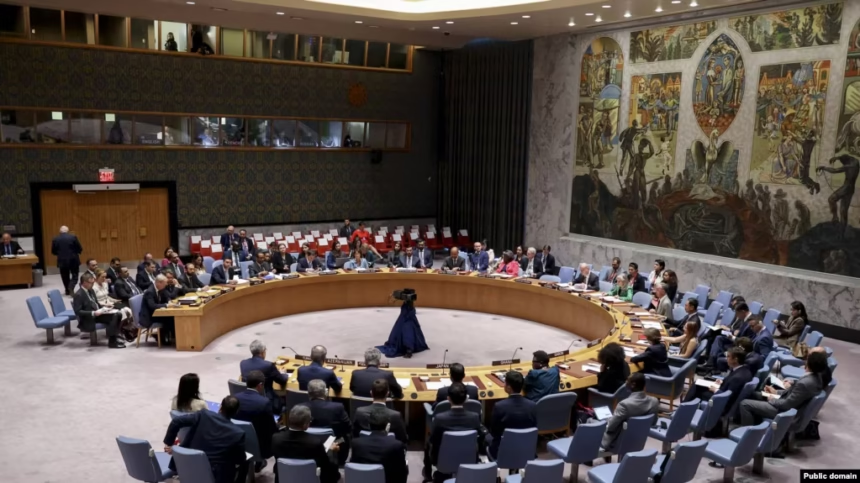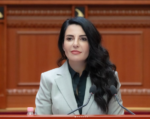Kosovo’s and Serbia’s chief diplomats traded accusations against each other’s countries during a United Nations Security Council meeting late Tuesday, where the semiannual report by UN Secretary-General Antonio Guterres on the UN Mission in Kosovo (UNMIK) was discussed.
Kosovo’s Acting Foreign Minister, Donika Gërvalla, said that Serbia “has not changed” and continues its efforts to destabilize Kosovo’s democracy, “not only through rhetoric but through concrete and violent actions that endanger peace and security in the region.”
Serbia’s Foreign Minister, Marko Đurić, complained that the situation for Serbs in Kosovo “is deteriorating” and that “Serbs are paying the price.”
Gërvalla stated that “in September 2023, Kosovo was the target of an armed incursion by a paramilitary group supported by Serbia and led by Milan Radoičić.”
“Banjska was a paramilitary act by one state against another, and the Ibër-Lepenc attack was a military-grade assault by one state against the critical infrastructure of another state,” Gërvalla said.
In September 2023, a Kosovo police officer and three attackers were killed when Kosovo Police were ambushed by an armed group of Serbs in northern Kosovo. Milan Radoičić, the former vice president of the Kosovo Serb political party Srpska Lista, which is backed by Belgrade, claimed responsibility for the attack.
Kosovo accuses Serbia of being behind both the Banjska attack and the explosion that damaged a water canal in the north at the end of 2024. Serbia has denied the accusations.
Gërvalla once again called on Serbia to extradite Radoičić, against whom Kosovo authorities have filed an indictment.
Meanwhile, Đurić said he could not “list all the unilateral actions taken by Prime Minister Albin Kurti’s government.”
“In recent months, Prishtina has escalated its campaign to systematically dismantle Serbian institutions across ‘Kosovo and Metohija.’ These are not symbolic gestures; they have direct consequences for people. Salaries, pensions, and social assistance for thousands of Serbian families have been cut. The means of survival for many of our compatriots have been put at risk,” Đurić said.
Kosovo authorities closed most institutions operating within the Serbian system over the past year, arguing that they were illegal, but Belgrade continued to provide salaries.
Members of the Serb community in Kosovo receive various benefits from Serbia’s budget, such as salaries, pensions, social assistance, and child and parental allowances.
Gjurić claimed that Serbs are leaving Kosovo and that attacks against them have increased, though he provided no evidence.
“Since Kurti came to power, 20 percent of Serbs have fled Kosovo. Attacks against Serbs have risen by 15 percent. Let’s not forget that more than 200,000 Serbs have been displaced since 1999, and only 2 percent have returned,” he said.
Đurić also demanded that Kosovo establish the Association of Serb-Majority Municipalities as a solution for the issues facing Serbs in Kosovo.
“When will the Association of Serb-Majority Municipalities be established? Kurti’s actions clearly show there is no will for it,” he said.
He added that “dialogue remains the only sustainable way forward, but it must be built on trust.”
Reactions from Foreign Representatives
U.S. representative John Kelley said that Kosovo and Serbia must work to de-escalate tensions, refrain from actions that escalate the situation, and build peace and stability between them and in the broader region as the foundation for a more prosperous future.
“The ultimate goal must be mutual recognition,” Kelley said.
He added that the normalization of relations between Kosovo and Serbia is essential for stability in the Western Balkans.
“The United States and the international community are safer when countries resolve conflicts peacefully and more prosperous when they create an environment for expanded trade and international investment,” he emphasized.
The Russian representative accused Kosovo of “continuing its policy of expelling Serb residents” after Kosovo, among other actions, banned the use of the Serbian dinar.
He added that the European Union is unable to influence Prishtina, emphasizing that the EU’s mediation has completely failed.
The EU representative again urged Kosovo and Serbia to begin implementing the 2023 Agreement on the Path to Normalization of Relations.







